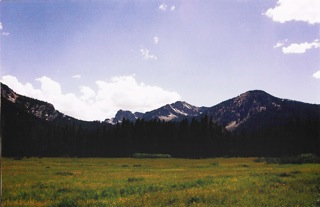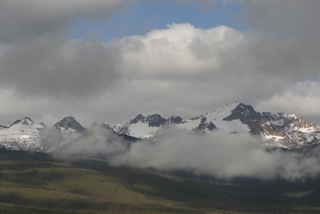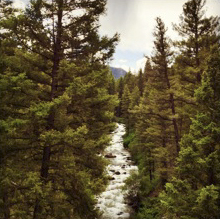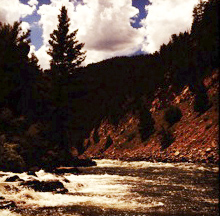Environment
We all share the environment. The earth, water, air and trees are what sustains and connects us all.
 June 10, 2022 Carole King attended a Forum hosted by Christensen Global and spoke about the perils of logging. Please read the story featured in Eye on Sun Valley.
June 10, 2022 Carole King attended a Forum hosted by Christensen Global and spoke about the perils of logging. Please read the story featured in Eye on Sun Valley.
May 19, 2022 Carole King wrote an opinion contribution titled 'America's forest are a key climate solution' which was published in TheHill.com. You can read the full piece here.
March 16, 2022
Carole King was back on Capitol Hill on March 16, 2022 to testify before the U.S. House Environment Subcommittee to educate them about why big fires are caused by climate change and logging.
You can watch Carole's testimony here and the entire meeting is available here.
January 11, 2022
Carole wrote an opinion contribution to TheHill.com in which she says, " Rather than providing billions more for multi-national timber corporations to move down vast swatchs of our national forests under the guise of 'restortion' and other euphemisms, let's allocate that money in the Build Back Better bill to help families and grow the economy." Please read the full piece at The Hill.com.
October 15, 2021
As congress continues to haggle over the multitrillion dollar infrastructure and reconciliation packages, Carole King spoke with Brianna Keilar on CNN's "New Day" Oct. 15, 2021 raising red flags and concerns regarding provisions in the bills encouraging logging. Watch the interview here.
April 29, 2021
Introduced April 21, 2021 by Senator Sheldon Whitehouse, S.1276 is a bill to designate certain National Forest System land and certain public land under the jurisdiction of the Secretary of the Interior in the States of Idaho, Montana, Oregon, Washington and Wyoming as wilderness, wild and scenic rivers, wildland recovery areas and biological connecting corridors and for other purposes (NREPA).
If your Senator is lead sponsor, Sheldon Whitehouse, or one of the current and original cosponsors on this list, please call or email to thank him or her.
Sen. Booker, Cory A. [D-NJ]
Sen. Blumenthal, Richard [D-CT]
Sen. Durbin, Rchard J. [D-IL]
Sen. Hassan, Margaret Wood [D-NH]
Sen. Shaheen, Jeanne [D-NH]
Sen. Markey, Edward [D-MA]
Sen. Brown, Sherrod [D-OH]
Sen. Warren, Elizabeth [D-MA]
Sen. Hirono, Mazie K. [DHI]
You can help make this visonary Wilderness bill by encouraging your members of Congress to co-sponsor and support the Northern Rockies Ecoystem Protection Act (NREPA) here.
*-*-*-*-* April 8, 2021 - Listen to the Wilderness Podcast interview with Mike Garrity of Alliance for the Wild Rockies about the Northern Rockies Ecosystem Protection Act (NREPA). This is why Carole has been working for 30 years to enact legislation for the Northern Rockies Ecosystem Protection Act (NREPA).
*-*-*-* March 10, 2021 - Congresswoman Mahoney is reintroducing the Northern Rockies Ecosystem Protection Act which will designate 23 million acres of roadless land in the Northern Rockies as wilderness. Trees absorb carbon dioxide from the air and convert it into oxygen, providing us with clean air to breathe - the most efficient and cost-effective way to combat climate change. Ask your member of Congress to cosponsor the Northern Rockies Ecosystem Protection Act (NREPA).
****** Sept. 28, 2019 - Carole King performed at Global Citizen Festival in NYC and urged climate action to support NREPA, on this day of powerful Global Movement. The Northern Rockies Ecosystem Protection Act will protect 24 million acres or carbon storage. Ask your Representatives, Senators and Candidates if they support NREPA and tell them they will need to work harder to earn your vote.
***** June 7, 2019 - Carole King appeared on Morning Joe to talk about her work with legislators to protect the Northern Rockies. Watch here.
****May 23, 2019 - Take Action! Urge Members of Congress to Support and Co-Sponsor NREPA!
*** April 2, 2019 - Carole King lobbies lawmakers in support of bill to protect the Northern Rockies. Read it in The Hill.
**March 13, 2019 - Mike Garrity and Carole King wrote about the threats to the Northern Rockies in an Op Ed piece that was published in the New York Times.
Carole said, "I have put my heart and soul into this legislation for nearly 30 years. I've been fortunate enough to work with a great group of people. Won't you join us in becoming an advocate for the Northern Rockies Ecosystem?"
Please read the entire piece here.
*UPDATE 2.25.2019 Rep. Maloney makes another push for 5-state wilderness area. Please read all about it here.
6.15.2016 NREPA has been put forward in a Senate bill for the first time! It has been introduced in the U.S. House in every Congressional session since 1992, but this is a first for the Senate. For more information and to help support the bill, please visit AWR.
If you care about the environment, let your elected representatives know your concerns. Remember, no matter whom you voted for, your representatives are there to represent YOU. The only way to overcome apathy and big money interests that want things that aren't good for you or the environment is to TAKE ACTION.
Fax, call or Email your elected officials. You may get a form letter back thanking you and saying they'll look into it. Don't let it stop there. Form letters are a way of acknowledging receipt of your communication while getting you off their desk. Don't let them take you off their desk. Keep faxing, calling and Emailing until they realize you're not going away. They'll have to give your concern the attention it deserves. Click here to read an "open letter" from Carole King regarding NREPA and the work that she does on behalf of NREPA.
Watch Carole's message urging the public's participation in calling for clean energy solutions, here.
You Can Help Save the Northern Rockies Ecosystem
In a world where a single vote can decide an election, your voice matters.
H.R. 996 was introduced February 13, 2015 (formerly H.R. 1187 introduced March 15, 2013). "To designate certain National Forest System lands and certain public lands under the jurisdiction of the Secretary of the Interior in the States of Idaho, Montana, Oregon, Washington and Wyoming as wilderness, wild and scenic rivers, wildland recovery areas, and biological connecting corridors, and for other purposes."
To learn more about this important legislation, please visit H.R. 996. Call, tweet & email your lawmakers today and ask them to support H.R. 996. Ask them to support the NREPA Facebook page.
The Northern Rockies ecosystem overlaps five states-Idaho, Montana, Oregon, Washington and Wyoming-but all Americans own the affected land, Many Americans don't know that their tax dollars are being spent to subsidize activities that are harmful to the land, water, and wildlife in the Northern Rockies ecosystem.
A hearing was held on May 5, 2009 that highlighted the need for protection of the nationally owned public wildlands covered by the Northern Rockies Ecosystem Protection Act (introduced at that time as H.R. 980). No private or state land is affected by NREPA—only federal land owned by all Americans. However, some elected officials in the five states seem to be paying so much heed to the ratcheted-up local rhetoric of fear in the states they represent that they're not listening to the voices of reason within their states. "It's too big" is not a good enough reason not to do something really good. It will take your voice and those of the residents of those states who understand the urgency of the need for NREPA's protection to get through to some of the more recalcitrant elected officials. History of NREPA can be found here.
 Historically local residents tend to resist new proposals for wilderness or parks, yet once such protection becomes law many of those same people speak proudly of their local wilderness or park and benefit from it economically over the long term. To paraphrase an elected official who protected a lot of land in his time: first they want to hang you; 10 years later they take tremendous pride in their local wilderness or park; then 25 years later they name a mountain after you.
Historically local residents tend to resist new proposals for wilderness or parks, yet once such protection becomes law many of those same people speak proudly of their local wilderness or park and benefit from it economically over the long term. To paraphrase an elected official who protected a lot of land in his time: first they want to hang you; 10 years later they take tremendous pride in their local wilderness or park; then 25 years later they name a mountain after you.
Once NREPA becomes law, we'll have some names to suggest of elected officials to have mountains named after them. But right now those mountains, water, and wildlife need your help.
If you have friends or relatives living in one or more of the five NREPA states—again, they are Idaho, Montana, Oregon, Washington and Wyoming—please ask them to contact their U.S. Senators and U.S. Representative and urge them to vote for H.R. 996, the Northern Rockies Ecosystem Protection Act (NREPA).
Your voice will help overcome the cacophony of fear. You are one of the smart people who care enough to make the world a better place. Let your voice restore harmony by taking action to save the Northern Rockies.
Below are links for U.S. Senators and a link to write to your U.S House Representative. Please review their contact page carefully as some prefer phone calls, faxes or regular mail as opposed to email and vice versa depending upon the urgency of the matter.
Thank you very much!
Idaho: Senator Mike Crapo
Idaho :Senator Jim Risch
THE ECOLOGICAL COSTS OF ENVIRONMENTALIST COLLABORATION
by MIKE GARRITY and CAROLE KING
If history has taught us anything, it's that America is a much better place when environmental laws are enforced. We need to make sure that people and organizations whose stated mission is to protect and enforce such laws remain fully committed to that mission. But right now, especially in regard to those lauding collaboration, it's very difficult to tell where some conservation groups stand.
Significant environmental compromises are being made by groups supporting national forest management legislation that negatively impacts wildlife habitat and old-growth forests and undermines the Wilderness Act of 1964. Unfortunately, such compromises fail to take into account the vast number of compromises that have already been made over the past century. As one friend put it recently, "They've cut the baby in half for so long they're now down to the toenails."
 A number of Montana timber mills recently ran a statewide attack ad on the Alliance for the Wild Rockies, claiming "the Forest Service is being held hostage by a small group of professional obstructionists." Senator Tester, meanwhile, publicly had this to say about those who oppose his Forest Jobs and Recreation Act, "extremists are extremists and I don’t really care."
A number of Montana timber mills recently ran a statewide attack ad on the Alliance for the Wild Rockies, claiming "the Forest Service is being held hostage by a small group of professional obstructionists." Senator Tester, meanwhile, publicly had this to say about those who oppose his Forest Jobs and Recreation Act, "extremists are extremists and I don’t really care."
We don't see taking an active part in national forest management or participating in a public policy debate as falling under such derogatory labels.
What's surprising is that while the Montana timber industry ads openly called for rolling back or eliminating public involvement in order to increase logging on public lands, the conservation groups with whom they've been collaborating have been strangely silent.
Do these groups agree with the timber industry's demands? If the "collaborative" groups believe we should eliminate the public appeals process and exempt many Montana timber sales from judicial review, they should say so openly to their members and the general public so everyone knows exactly where they stand. If their goal is to protect land and wildlife in a meaningful way, they should speak up in defense of maintaining full public involvement and judicial review in public lands management.
The mission of the Alliance for the Wild Rockies is "to secure ecological integrity of the Wild Rockies bioregion through citizen empowerment and the application of conservation biology, sustainable economic models and environmental law." Enforcing the environmental laws of the United States that apply to public lands management is critical to maintaining ecological integrity.
When our government doesn't follow the requirements of those laws, the Alliance turns to the courts to force federal agencies to follow the law. Our record is clear. Our success in the vast majority of our lawsuits proves beyond a doubt that our claims have merit.
 It's easy to see how a climate of silence from the "collaborative" groups might encourage the Forest Service to believe it can avoid full compliance with environmental laws. It's more difficult to understand why, when a citizen group steps forward to see that our nation's laws are enforced, the "collaborative" conservation groups go on a well-financed public relations campaign and their industry "partners" launch statewide attack ads against that group.
It's easy to see how a climate of silence from the "collaborative" groups might encourage the Forest Service to believe it can avoid full compliance with environmental laws. It's more difficult to understand why, when a citizen group steps forward to see that our nation's laws are enforced, the "collaborative" conservation groups go on a well-financed public relations campaign and their industry "partners" launch statewide attack ads against that group.
It's clear that corporations want subsidized access to public lands unencumbered by environmental laws. When the government follows the law, the Alliance supports its actions. When it doesn't, we go to court. That's how democracy works, and that's where we stand.
This article was published at CounterPunch.org June 15-17, 2012
Please check out these wonderful organizations that are working hard to protect the enviornment.
Alliance for the Wild Rockies
www.wildrockiesalliance.org
Wilderness Watch
www.wildernesswatch.org


